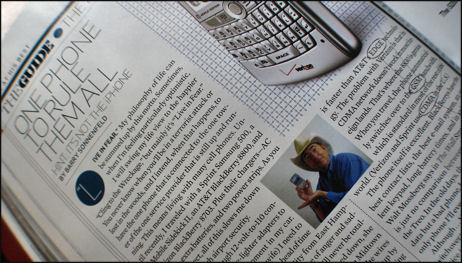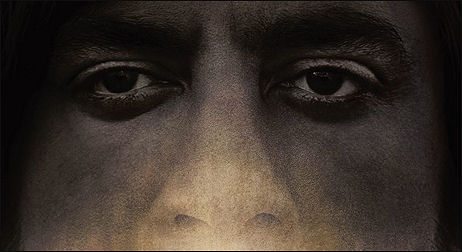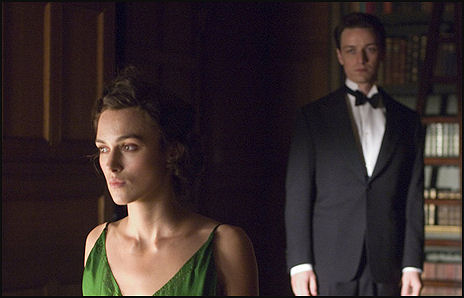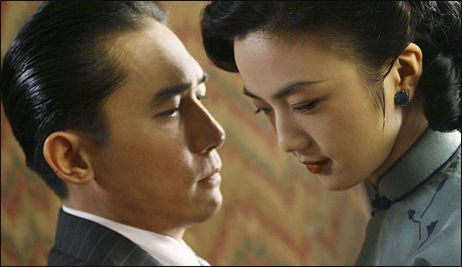“Sailing to Byzantium,” the William Butler Yeats poem from which Cormac McCarthy derived the title of “No Country for Old Men.” Yates, not Yeets.
Sonnenfeld and the Blackberry
Every now and then I stop what I’m doing and say a small prayer of thanks that Barry Sonnenfeld appears to be working mostly on the tube these days and is no longer making awful CGI-pestilence movies like Men in Black and Wild Wild West or grotesque family slapstick comedies like RV. Or is taking a breather from these, at the very least.

Barry Sonnenfeld extolling the virtues of the Blackberry 8830 World Edition on page 114 of the new Esquire
This morning I was reading a piece Sonnenfeld has written for the latest issue of Esquire (i.e., Sean Penn on the cover) about the Verizon Blackberry 8830 World Edition, and I said to myself, “My God, it’s wonderful not to have this guy’s movies in my head any more.” Sonnenfeld is loaded and kicking back these days (he has homes in Telluride and East Hampton). I hope to God he stays in that realm and enjoys his lifestyle to the fullest.
Chigurh is a ghost
Anne Thompson reports that the No Country for Old Men red-band trailer will be “live beginning Friday. ” You have to click on the “exclusive red-band trailer” link on the film’s website, but it didn’t work for me after six or seven tries on two different browsers. Wait — a reader has finally located a ready-to-go trailer with no sign-ins. It’s brilliant — a much better trailer than the previous G-rated one.

Thompson says that it’s necessary to see the red-band trailer “so that audiences can see why the mean SOB played by Javier Bardem is really, really scary.”
He is that, but Bardem’s character, a guy named Anton Chigurh (“sugar?”), isn’t an actual SOB. What he is, in fact, is a “ghost,” as Tommy Lee Jones‘ sheriff calls him at one point. That’s hitting it square on the head, I suppose (on top of Bardem’s face being a chalky white), but it’s the Coen brothers’ way of saying to the dumbasses in the audience that “this movie isn’t necessarily about a bad guy killing people and another guy trying to get away with some dope money.”
Chigurh is a kind of metaphor for enveloping darkness and cultural downfall…a falling-away from decency and values that some (mostly older guys) feel has manifested in this country. It’s all written down in Cormac McCarthy‘s original novel. Chigurh is also a bringer of fate. The other big theme in the book is, “You can’t see what’s comin’ and you can’t stop what’s comin’.” That’s Anton, baby.
McCarthy is a poet-novelist of the heartland and the Coens have made a thrilling art-house splatter film without the splatter — they show no gore, always cut away, etc. 90% of the people out there can’t perceive anything in a film except subject matter, but this is one of those cases when even the Seth Rogen types with the Cabo San Lucas T-shirts need to try and look beyond and within.
Holden trashes Johansson
“Because The Nanny Diaries is essentially a two-character story whose supporting players are wooden props, it would help if the actors playing the two were evenly matched. But Scarlett Johansson‘s Annie, who narrates the movie in a glum, plodding voice, is a leaden screen presence, devoid of charm and humor. With her heavy-lidded eyes and plump lips, Johansson may smolder invitingly in certain roles, but The Nanny Diaries is the latest in a string of films that suggest that this somnolent actress confuses sullen attitudinizing with acting.” — from Stephen Holden‘s 8.24 N.Y. Times review.
“Atonement” praise & rebuttals
Critics who’ve seen Joe Wright‘s Atonement (Focus Features, 12.7) have reacted with breathless superlatives,” according to the Daily Telegraph‘s amiable and usually accommodating David Gritten, “and its showing at the Venice Film Festival and subsequent release will almost certainly catapult Wright into the ranks of world-class film directors.”

Keira Knightley, James McAvoy in Atonement
Oh, yeah? I’ve heard some reactions also and no one’s said anything about viewers doing cartwheels in the lobby. What I’ve heard is “pretty good,” “not at all bad” and “has at least one really good extended tracking shot.”
One also has to consider the unfortunate fact that the two romantic leads, Keira Knightley and James McAvoy, are not only limited talents but have physical traits and tics that can arouse huge irritation at the drop of a hat.
I had trouble with McAvoy in The Last King of Scotland because of his pathetic hunger and eagerness to charm (i.e., that Hugh Grant thing) and his unfortunately large bee-stung nose. I wrote McAvoy off for dead after seeing him in last year’s Starter for 10, a dreadfully cloying and unseductive film. However good Wright’s new film may turn out to be, McAvoy is more or less “over” — he had his fifteen minutes in ’06, and the world has moved on.
I wrote Knightley off two years ago as an overpraised and under-talented actress who has that flirty thing down but lacks an essential inner aliveness, that river-of- feeling quality that all good actresses have.
What’s with Hollywood Wiretap?
What is the deal with Hollywood Wiretap? The front-page layout has been whacked for two days now, and when you write editor Tom Tapp to ask what’s up the e-mail bounces right back. HE has gone through brief shutdowns and weirdnesses over the last three years, but never for two days straight….c’mon. Update: Hollywood Wiretap was finally up and looking like its old self as of 10:30 pm this evening.
Lurie “thinks” his movie is about, etc.
“I think this will resonate,” Resurrecting The Champ director- writer Rod Lurie has told the Pasadena Weekly‘s Carl Kozlowski. “I think the movie is about a group of people, journalists, who police themselves like no other profession. No other group is as vigilant about maintaining its honor and that’s what I like. Journalists do mea culpas all the time.”

Lurie “thinks” his film is about self-policing journalists? What happened here is that sometimes people say “I think” when they really mean “this is how it is.” The prob- lem came with the editing of the article. Any journalist or editor who knows about making quotes and subjects sound right would have removed that second “think.” I think the Pasadena Weekly should have thought this one through.
New tracking
It’s still a toss-up between The Nannie Dairies (67, 30, 12) and War (56, 39 and 8) for the #1 newbie slot this weekend. Mr. Bean’s Holiday (72,27, 7)…modest, under$10 million. Rod Lurie ‘s Resurrecting the Champ is at 67, 25 and 2. The overall winner will be Superbad with a three-day tally of somewhere north of $20 million.
“Lust, Caution” gets an NC-17
I asked a Focus Features publicist earlier today to explain exactly what had prompted the MPAA’s ratings board to give Ang Lee‘s Lust, Caution an NC-17 rating. The official statement blamed “some explicit sexuality” but what was the actual depicted offense or offenses? The publicist declined to be specific but used terms like “hot,” “fucking sexy,” “aggressively sexual” and the like. He also sent over a statement from Focus honcho and Lust, Caution co-writer James Schamus that said Focus Features “accepts the MPAA’s NC-17 rating without protest.”

Described in certain circles as “an erotic espionage drama,” Lust, Caution will open in NYC on 9.28 and in L.A. in on 10.5. It’s a Notorious-like drama, based on a short story by Eileen Change, about a young Chinese woman (Tang Wei) — who begins an affair an older Chinese collaborator (Tony Leung) in order to pass along his secrets to authorities so they can bust him.
In the film’s production notes, says Variety, Schamus has “likened the lead femme character to Maria Schneider‘s role in Last Tango in Paris, another sexually explicit pic that received an X rating for its 1973 release and was subsequently rated NC-17 for a homevideo reissue.”
Oh, I get it. The NC-17 rating is about something “to stick in your weah, my deah.” What other Tango parallel could Schamus be alluding to? Savoring the eating of a dead rat’s asshole because it tastes good with mayonnaise?
The Hollywood Reporter‘s Gregg Goldstein managed to dig up a quite from a Focus Features rep that alluded to the MPAA having had problems with numerous “pelvic thrusts.”
“Heartbreak Kid” trailer
I’ve already expressed my concerns and suspicions about The Heartbreak Kid (Dreamamount, 10.5), the Ben Stiller-Farrelly brothers comedy that appears to have had problems (i.e., issues of estrangement, respectful disagreements) with Elaine May‘s 1972 original and thereby gone its own way.
Downer Toronto
Whoooo…gloomy Toronto, darkness and shadows, such long faces, etc. What does it say about our times and our culture that a big-deal film festival is in such a downer mood? One of the most despairing movies being screened at Toronto is a real drink-from-the-dregs, life-can- definitely-suck story about post-traumatic stress syndrome, currents of futility and rage in young people, middle-aged alcoholism, a guy walking around with hooks instead of hands, economic hurt, infidelity, etc. Why can’t there be more in the way of positive portraits?
Fall and Rise of Tom Cruise
The fall and rise of Tom Cruise over the past two years, as recalled by N.Y. Daily News reporter John Clark. This article is basically saying that the let-him-have-it media pile-on that made Cruise into a target beginning with Oprah-couch in May ’05 pretty much peaked last summer and is now on the wane.

